Syria gas attack: death toll at 1,400 worst since Halabja
Attack on Damascus could represent most significant use of chemical weapons since Saddam attacks Iraqi Kurds
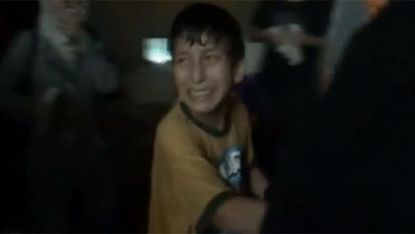
THE APPARENT gas attack on rebel-held areas of the Syrian capital Damascus may have killed as many as 1,400 people and has been described as the most significant use of chemical weapons since Saddam Hussein gassed Iraqi Kurds in Halabja in 1988.
The UN yesterday said reports of yesterday’s attack, as yet unverified, could represent a "serious escalation" in the two-year-old conflict but also called for "clarity" over the incident in the East Ghouta region of the capital. There were demands from some countries, including the US, UK and France, for UN weapons inspectors already in Syria to be dispatched immediately to the scene. However, Deputy Secretary-General Jan Eliasson said any investigation into the incident would require the consent of the Syrian government and was dependent on the security situation. According to The Times, a UN Security Council meeting ended "with little apparent agreement on the appropriate response". But the paper notes that the attack comes a year after US President Barack Obama warned Syria that any use of chemical weapons would mean crossing a "red line". The Syrian government has admitted an attack on the area yesterday, but dismissed claims that it used toxic gas, calling the allegations "lies that serve the propaganda of the terrorists". Whatever Assad’s regime may say, yesterday’s attack looks certain to prove a watershed moment. As The Independent reports, the fallout will "have a major impact on the course of the conflict... Evidence that the regime has indeed used WMDs, with such a massive number of fatalities, would greatly strengthen the hands of those pressing for large-scale supplies of advanced weapons to the rebels. "Evidence that the footage was fabricated would further dent the already fragile credibility of the disjointed opposition and weaken the position of their Western sponsors." More than 100 videos of the aftermath of the rocket attacks, which began in the early hours of Wednesday, have now been uploaded to the internet. They appear to show men, women and children suffering the effects of poisoning. Some are shown foaming at the mouth, others writhing in distress. The BBC says it is unlikely that the footage is manufactured. "While it is not clear how many died in the bombardment of the sites and how many deaths were due to any exposure to toxic substances, experts say it would be almost impossible to fake so many dead and injured including children and babies."
Subscribe to The Week
Escape your echo chamber. Get the facts behind the news, plus analysis from multiple perspectives.

Sign up for The Week's Free Newsletters
From our morning news briefing to a weekly Good News Newsletter, get the best of The Week delivered directly to your inbox.
From our morning news briefing to a weekly Good News Newsletter, get the best of The Week delivered directly to your inbox.
Create an account with the same email registered to your subscription to unlock access.
Sign up for Today's Best Articles in your inbox
A free daily email with the biggest news stories of the day – and the best features from TheWeek.com
-
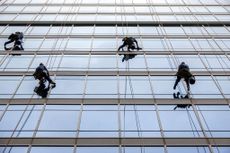 'New arrivals are more than paying for themselves'
'New arrivals are more than paying for themselves'Instant Opinion Opinion, comment and editorials of the day
By Harold Maass, The Week US Published
-
 6 stylish homes in Portland, Oregon
6 stylish homes in Portland, OregonFeature Featuring a wall of windows in Collins View and a historic ballroom in Portland Heights
By The Week US Published
-
 What's next for US interest rates?
What's next for US interest rates?The Explainer Stubborn inflation forestalls anticipated rate cuts
By Becca Stanek, The Week US Published
-
 Weinstein's appeal: a blow to #MeToo
Weinstein's appeal: a blow to #MeTooTalking Point Is 'shocking' reversal of symbolic conviction a sign of weakening movement?
By The Week UK Published
-
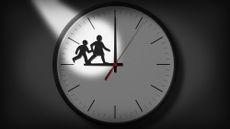 Do youth curfews work?
Do youth curfews work?Today's big question Banning unaccompanied children from towns and cities is popular with some voters but is contentious politically
By Harriet Marsden, The Week UK Published
-
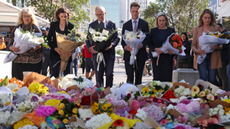 Sydney mall attacker may have targeted women
Sydney mall attacker may have targeted womenSpeed Read Police commissioner says gender of victims is 'area of interest' to investigators
By Julia O'Driscoll, The Week UK Published
-
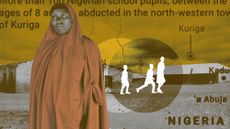 Why are kidnappings in Nigeria on the rise again?
Why are kidnappings in Nigeria on the rise again?Today's Big Question Hundreds of children and displaced people are missing as kidnap-for-ransom 'bandits' return
By Julia O'Driscoll, The Week UK Published
-
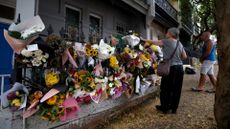 Deaths of Jesse Baird and Luke Davies hang over Sydney's Mardi Gras
Deaths of Jesse Baird and Luke Davies hang over Sydney's Mardi GrasThe Explainer Police officer, the former partner of TV presenter victim, charged with two counts of murder after turning himself in
By Austin Chen, The Week UK Published
-
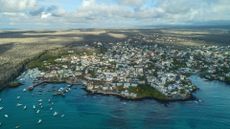 How the idyllic Galapagos Islands became staging post in world drug trade
How the idyllic Galapagos Islands became staging post in world drug tradeUnder the radar Ecuador's crackdown on gang violence forces drug traffickers into Pacific routes to meet cocaine demand
By Harriet Marsden, The Week UK Published
-
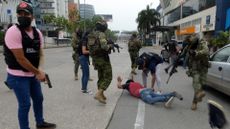 Armed gangs, prison breaks and on-air hostages: how Ecuador was plunged into crisis
Armed gangs, prison breaks and on-air hostages: how Ecuador was plunged into crisisThe Explainer Gangs launch deadly revenge after president declares state of emergency following escape of feared drug boss from prison
By Harriet Marsden, The Week UK Published
-
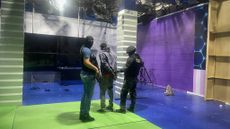 Ecuador tips toward chaos amid prison breaks, armed TV takeover
Ecuador tips toward chaos amid prison breaks, armed TV takeoverSpeed Read New President Daniel Noboa authorized the military to 'neutralize' powerful drug-linked gangs after they unleashed violence and terror across Ecuador
By Peter Weber, The Week US Published